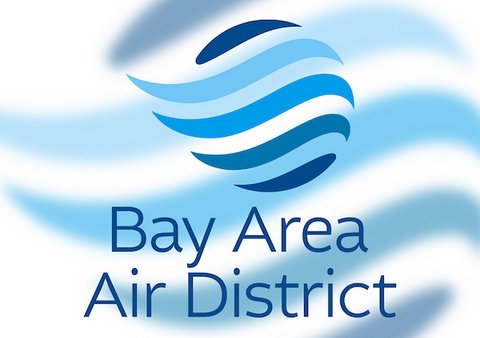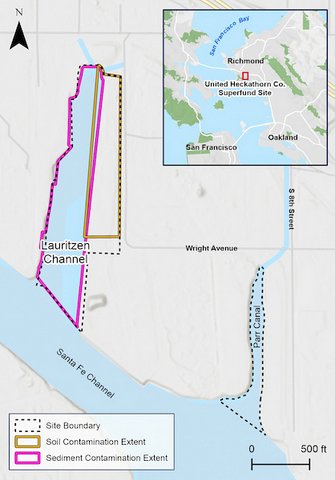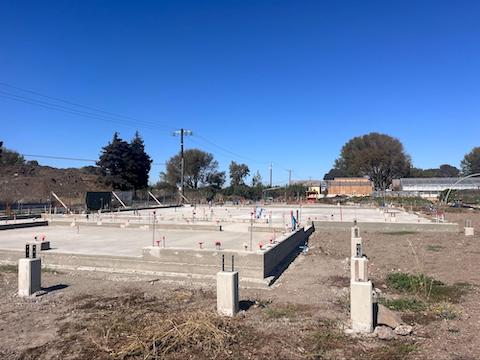
03 Apr Bay Area Air District Board Considers Retaliating Against EPA Deregulations

The Bay Area Air District is tasked with regulating stationary sources of air pollution in the nine counties that surround San Francisco Bay: Alameda, Contra Costa, Marin, Napa, San Francisco, San Mateo, Santa Clara, southwestern Solano, and southern Sonoma counties. (Bay Area Air District via Bay City News)
By Ruth Dusseault
Bay City News
President Donald Trump’s administration is trying to keep California from having stricter-than-average vehicle emission standards. That was just one of the challenges discussed Wednesday by the Bay Area Air District Board of Directors.
The board reviewed the impacts of cuts to federal programs and other regulatory obstacles coming from new U.S. Environmental Protection Agency administrator Lee Zeldin. Last month, Zeldin announced the “biggest deregulatory action in U.S. history,” including 31 specific actions, many of which impact air quality.
The federal Clean Air Act grants California the authority to implement stricter vehicle emissions standards than federal requirements, but these regulations require a waiver from the U.S. EPA.
Historically, the EPA has granted over 100 waivers to California, according to the air district’s counsel Carrie Schilling, but Trump’s administration has indicated it intends to deny such requests. This change could have significant implications, including increased emissions and health impacts on communities near major diesel truck routes.
Schilling said, however, that executive orders and press releases may impact how the EPA does business, but for now they are just goals.
“The EPA will have to take further action in order to actually change the regulations on the books,” said Schilling.
The Congressional Review Act gives Congress the authority to review recently adopted rules. Federal agencies must submit all rules to the Government Accountability Office and to Congress for review. If Congress does not like the rule, they can pass a resolution through both houses to disapprove it.
“That is a lengthy process and typically takes years,” she said. “Particularly for rules that apply nationwide, and litigation will probably follow. However, EPA does have some authority to issue an administrative stay of the existing rule of the California Air Resources Board motor vehicle waivers.”
Schilling showed eight waivers that have already been withdrawn, including one related to locomotives.
The California Air Resources Board did a modeling study in two communities that are near railways and determined that implementing the waivers will reduce cancer risk by over 90% due to reduced diesel parts per million between 2020 and 2045, she said. “And now that waiver’s already been withdrawn.”
Back in 2007, the U.S. Supreme Court determined that greenhouse gases are air pollutants that threatened public health and are covered by the Clean Air Act.
“The evidence is overwhelming that we’re experiencing the consequences of climate change,” Schilling said. “To successfully roll back that finding, the EPA would have to demonstrate a factual record that climate change is not happening or it’s not a problem.”
Additionally, the Inflation Reduction Act passed in 2022 amended the Clean Air Act and added new provisions that specifically speak to the regulation of greenhouse gases. It provided authority and resources to the EPA to regulate them.
But now the EPA is reconstituting the Clean Air Scientific Advisory Committee and the Science Advisory Board, which it relies on for scientific guidance on rulemakings.
“The new administration has fired all members of these committees,” Schilling said. “So, it’s likely the EPA will not be able to rely on them for scientific support in any reconsideration rule.”
Contra Costa County Supervisor John Gioia urged the air district to keep its members informed in the event that local cities or counties need to join in on any litigation opportunities.
The board’s executive officer Philip Fine said that he had a list of 400 federal grants that have been canceled by the administration. All of them were environmental justice grants meant to empower disadvantaged communities who want to reduce greenhouse gases, or they are living near pollution or dealing with the waste left over from an industrial century. Fifty-four of them were in California.
In the Bay Area, the EPA cut a $19 million grant to the North Richmond Community Resilience Initiative. It runs programs to green the neighborhood through landscaping and trees, install energy-efficient systems in homes, increase food security, reduce exposure to harmful pollutants, improve air quality and mitigate the urban heat island effect.
Many of the Bay Area projects canceled by the EPA included funds dedicated to communities under the Inflation Reduction Act.
In San Francisco, federal funding was dedicated to an indigenous community garden located in Golden Gate Park. It was centered around traditional indigenous ecological knowledge, the cornerstone of regenerative agriculture.
In Marin County, the Canal Alliance was working on sea level resilience solutions with the communities of San Rafael and Marin City. The West Oakland Environmental Indicators Project won funding to support an existing action plan to reduce exposure to emissions and improve public health. The Treasure Island Mobility Management Agency won funds to establish clean public transit systems. South of the Bay Area, the Community Water Center won a grant to consolidate the Pajaro, Sunny Mesa, and Springfield water systems into a single more resilient safe drinking water system. The Bay Wheels regional bike share program in San Jose would expand its bikeshare network to greater downtown to include underserved neighborhoods.
At the conclusion of the meeting, the air district executive officer Fine shared an anecdote about what is happening in the EPA offices in Washington, D.C.
“In conjunction with that list that went to a committee of Congress was a legal memo from inside EPA telling its grant officers how to respond to complaints about canceled grants,” he said. “In so many words, it essentially says, ‘sue us.’
Copyright © 2025 Bay City News, Inc. All rights reserved. Republication, rebroadcast or redistribution without the express written consent of Bay City News, Inc. is prohibited. Bay City News is a 24/7 news service covering the greater Bay Area.






No Comments